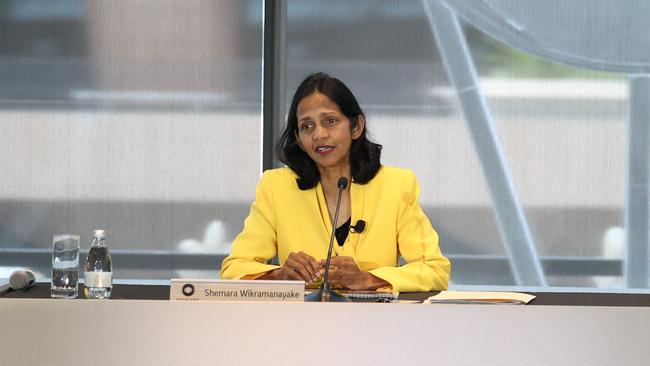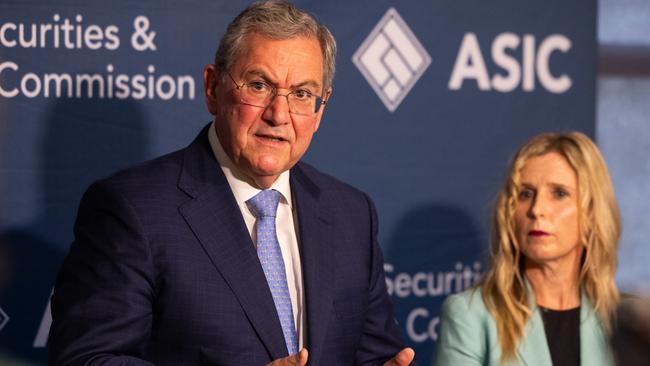Macquarie Group profit rises but warns on trade chaos and inflation as CEO paid $24m
Macquarie paid its CEO $24m in a year when it smashed market profit forecasts but says trade faces the most intense pressure in decades. Find out who got the hefty pay packets.

Macquarie Group rewarded its chief executive with a $24m pay packet as it booked a $3.71bn profit, but the Australian financial giant warned trade chaos and a potential inflation upset lie ahead.
Ruling off its full year financials on Friday, up 5 per cent on last year, Macquarie’s result was carried by a strong second half where earnings were up 30 per cent on levels reported in the six months to September 2024.
Chair and former Reserve Bank governor Glenn Stevens conceded many risks colour the outlook, pointing to concerns around price stability and tariffs, and describing “considerable shifts in public policy priorities”.
“Not only are several jurisdictions recalibrating their decarbonisation plans, but freedom of trade in goods and services is under the most intense pressure for decades,” he wrote in his annual letter to shareholders.
CEO Shemara Wikramanayake said the group had “remained resilient over the past year, delivering new business origination and underlying income growth, contributing to our history of unbroken profitability”.
The result beat analyst expectations amid uncertainty around the trading performance of the financial giant and concerns of lower commodities income and subdued Macquarie Capital asset sales.
Ms Wikramanayake said Macquarie was positioned to grow, with eyes on its private markets business after selling its North America and European investment operations, formerly known as Delaware, to Nomura in a $2.8bn deal.
Nomura has agreed to seed Macquarie’s private credit play with $300m.
Ms Wikramanayake, who is among the best paid executives in Australia, said Macquarie “remains well positioned to deliver superior performance in the medium term”.
Her pay packet was a slight haircut on her $25.2m earned last year.
Only Macquarie’s Commodities and Global Markets boss Simon Wright came close to the CEO after taking home $22.7m in the 2025 financial year.
Macquarie Asset Management’s boss Ben Way made $12.7m, up from $11.3m.
Macquarie Capital boss Michael Silverton banked $11.65m, little changed, while Greg Ward, Macquarie’s Banking and Financial Services boss, earned $11.6m, also little changed.
The Macquarie boss said the financial giant was delivering “patient adjacent growth across new products and new markets; ongoing investment in our operating platform; a strong and conservative balance sheet; and a proven risk management framework and culture”.
However, Macquarie is also facing regulatory pressures, after the Australian Securities & Investments Commission hit the bank with remediation and compliance orders on Wednesday.
Fitch Ratings warned this could pressure Macquarie’s credit rating if investigations discover “widespread weaknesses in MBL’s risk controls”.

Mr Stevens noted there had been remuneration consequences for staff tied to the ASIC issues, and the board was disappointed by the license conditions imposed by the regulator.
This is in addition to the prudential regulator’s $500m capital penalty, still standing after it was imposed in 2021, over risk failures.
Net operating income was up 2 per cent to $17.2bn, while expenses were “in line” with last year at $12.1bn after a 5 per cent fall in staff numbers to 19,735.
The banking business drove $1.38bn of Macquarie’s profit, up 11 per cent.
Commodities and Global Markets represented $2.82bn of profit, down 12 per cent, as clients pulled back amid subdued conditions in gas, power, and oil markets.
Macquarie Capital made a $1bn contribution, in line with the group’s result last year, with higher advisory and broker fees offset by lower income driven by impairment reversals and higher funding costs.
Macquarie said it would continue its share buy back, extended by 12 months in November, with only $1.01bn of the $2bn budget spent.
The group declared a $3.90 dividend, 35 per cent franked, taking total cash returns to $6.50 for the year.
Macquarie said it would “maintain a cautious stance, with a conservative approach to capital, funding and liquidity”.
JP Morgan analyst Andrew Triggs had cautioned 2026 guidance was likely to significantly disappoint, with consensus estimates of 15 per cent earnings growth in 2026 “quite unrealistic”.
UBS analyst John Storey noted Macquarie’s results had been buoyed by the unexpected $185m sale of the group’s helicopter rental business.
Climate lobby group Market Forces also took aim at the group over its lending to gas and oil projects, warning the “alarming increase” showed why Macquarie pulled out of the Net Zero Banking Alliance.
Market Forces research head Kyle Robertson said Macquarie “has shown its true colours, leapfrogging towards the top of the leaderboard to rival the big four Australian banks for oil and gas extraction lending”.
Shares in Macquarie traded up 4 per cent to $203.31.





